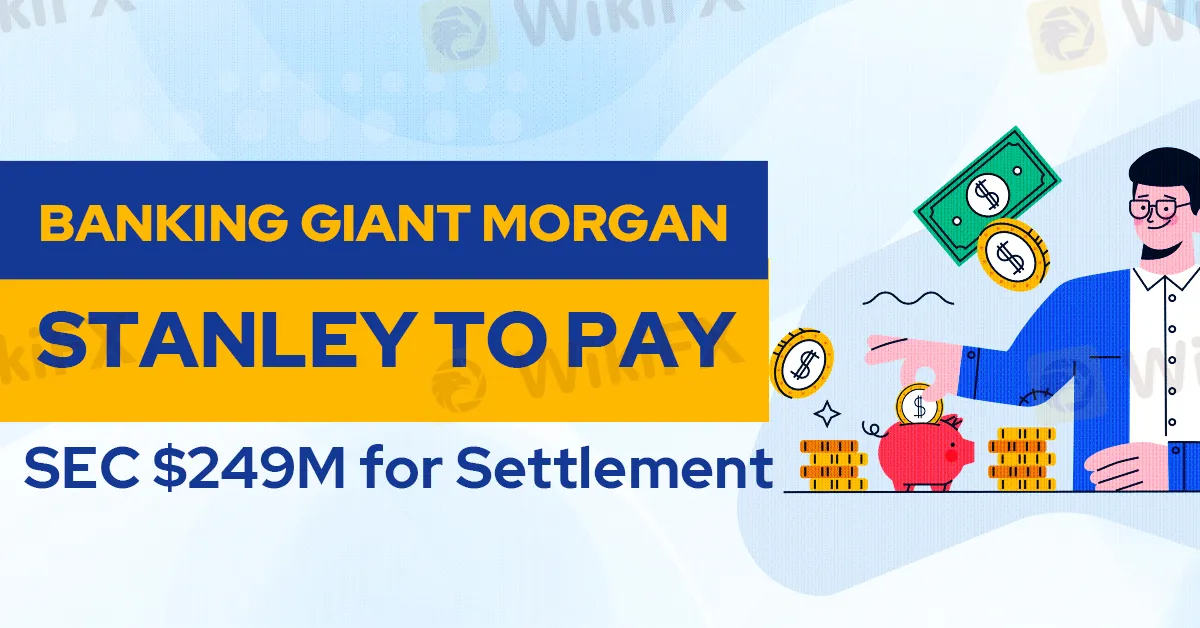简体中文
繁體中文
English
Pусский
日本語
ภาษาไทย
Tiếng Việt
Bahasa Indonesia
Español
हिन्दी
Filippiiniläinen
Français
Deutsch
Português
Türkçe
한국어
العربية
Banking Giant Morgan Stanley to Pay SEC $249M for Settlement
Abstract:This article unravels the Securities and Exchange Commission's charges against Morgan Stanley & Co. LLC and its former equity syndicate desk head, Pawan Passi, exposing a multi-year fraud involving the unauthorized disclosure of confidential information in the realm of block trades.

Last week, the Securities and Exchange Commission (SEC) brought charges against Morgan Stanley & Co. LLC, a prominent investment banking giant, and Pawan Passi, the former head of its equity syndicate desk. The charges pertain to a lengthy period of fraud involving the disclosure of confidential information related to the sale of substantial quantities of stock, commonly referred to as “block trades.” Additionally, the SEC accused Morgan Stanley of neglecting to enforce its policies addressing the misuse of material non-public information linked to block trades.
Block trades typically involve the private arrangement and execution of a substantial number of shares of a company's stock outside the public markets.
According to the SEC's findings, spanning from June 2018 to August 2021, Passi and a subordinate on Morgan Stanley's equity syndicate desk revealed non-public, potentially market-moving information about imminent block trades to select buy-side investors. This disclosure occurred despite confidentiality requests from the sellers and Morgan Stanley's own policies concerning confidential information handling.

The SEC's orders assert that Morgan Stanley and Passi shared the block trade information with the expectation that the buy-side investors would utilize it to “pre-position” themselves by taking significant short positions in the stock slated for the impending block trade.
As per the SEC orders, in the event that Morgan Stanley proceeded to purchase the block trade, the buy-side investors would then seek and receive allocations from Morgan Stanley to cover their short positions. This pre-positioning strategy effectively mitigated Morgan Stanley's risk in acquiring block trades.
The SEC's order also notes Morgan Stanley's failure to implement effective information barriers, preventing material non-public information about specific block trades from being transmitted by the equity syndicate desk, situated on the private side of Morgan Stanley, to a trading division on the public side. Consequently, the firm could not adequately scrutinize whether trades by that division, made while the equity syndicate desk was in talks with selling shareholders regarding potential block trades, were based on confidential discussions.
The SEC's order against Morgan Stanley determines that the firm willfully violated Sections 10(b) and 15(g) of the Securities Exchange Act of 1934 and Rule 10b-5(b) thereunder. As a result, the firm is censured and required to pay around $138 million in disgorgement, approximately $28 million in prejudgment interest, and an $83 million civil penalty.
Concerning Pawan Passi, the SEC's order finds him willfully violating Section 10(b) of the Exchange Act and Rule 10b-5 thereunder. He is mandated to pay a $250,000 civil penalty and faces associational, penny stock, and supervisory bars.
In a simultaneous development, the U.S. Attorney's Office for the Southern District of New York announced criminal resolutions with both Morgan Stanley and Passi. The SEC's ordered disgorgement and prejudgment interest for Morgan Stanley will be considered partially satisfied by the firm's forfeiture and restitution, totaling $136,531,223, as part of its criminal resolution.

Disclaimer:
The views in this article only represent the author's personal views, and do not constitute investment advice on this platform. This platform does not guarantee the accuracy, completeness and timeliness of the information in the article, and will not be liable for any loss caused by the use of or reliance on the information in the article.
Read more

RM650,000 Lost in Investment Fraud Advertised on Social Media
A Malaysian manager has suffered a devastating financial loss of RM651,800 after falling prey to a deceptive investment scheme via a Facebook advertisement that promised lucrative returns within a short timeframe.

Scam Alert: Retired Teacher Loses RM700,000 to Stocks Qs Secure
A 69-year-old retired teacher and part-time contractor has lost more than RM700,000 after falling victim to an online investment scam advertised on Google.

Shocking! Oil Prices Plunge Below $60
Oil prices are in free fall. On April 7, the market extended its slide — WTI crude dropped below $60 per barrel, while Brent crude fell to $63, hitting a four-year low.

Gold Prices Plunge: How Should Investors Respond?
Is Gold No Longer a Safe Haven? Prices Plunge and Investors Panic!
WikiFX Broker
Latest News
INFINOX Partners with Acelerador Racing for Porsche Cup Brazil 2025
Global Panic Builds as Forex Shifts into Risk-Off Mode
SEC Fines Velox Clearing $500,000 for SAR Failures
Shocking! Oil Prices Plunge Below $60
BI Alerts Filipinos: Telegram, Facebook Used for Trafficking Scams
AUD/USD Hits New Lows as Panic Selling Unfolds Amid Robust U.S. Jobs Report
FCA Released New List of Unauthorized Brokers
How to protect your money during Black Monday
Singapore Authorities Warned Against WeChat, UnionPay, Alipay Impersonation Scams
Deepfake Scams Nearly Drain $499K from Business
Currency Calculator







